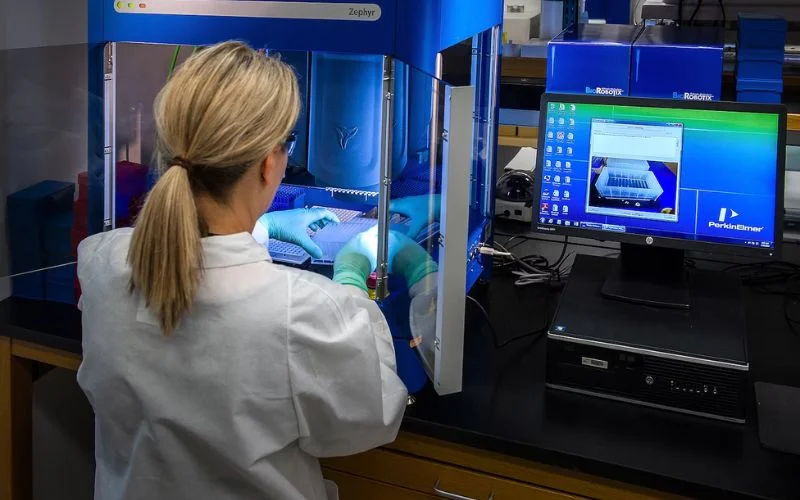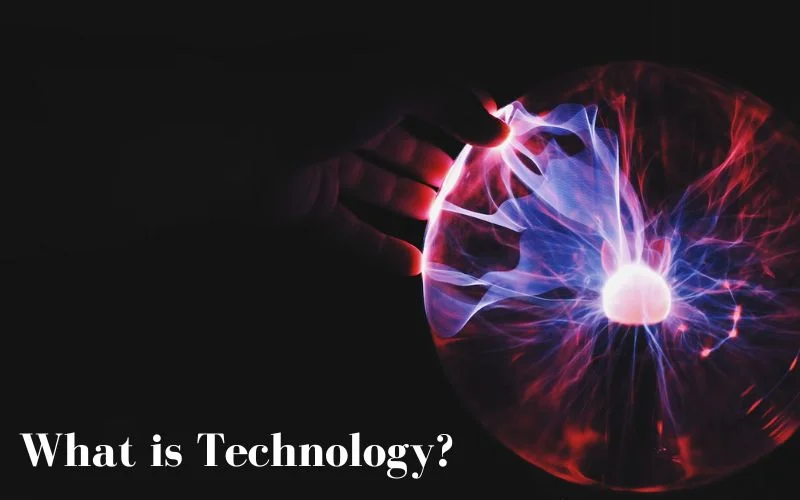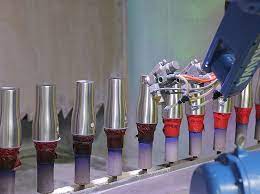In the digital age, technology is the heartbeat of our world. From the devices we carry in our pockets to the innovations that power industries, technology permeates every facet of modern life. It’s the driving force behind progress, the key to convenience, and the bridge to a future we’re only beginning to fathom. But what, exactly, is technology? How has it evolved over centuries, and what role does it play in shaping our present and future?
In this comprehensive exploration, we embark on a captivating journey into the realm of technology. We’ll delve into the definition of technology, the myriad types that exist, and its historical evolution from the humble wheel to the age of artificial intelligence. We’ll uncover the profound impacts it has on our daily lives, society, business, education, and healthcare. Along the way, we’ll navigate the ethical and philosophical complexities that technology introduces and gaze into the future to glimpse the transformative innovations waiting on the horizon.
Join us as we unravel the mysteries, celebrate the achievements, and contemplate the responsibilities of technology in our ever-evolving world. It’s a journey that promises to ignite your curiosity, deepen your understanding, and inspire your vision for the boundless potential of human innovation. Welcome to the captivating universe of technology, where the possibilities are as limitless as the human imagination.
Contents
Introduction to Technology:
Defining Technology
Technology, often referred to as the driving force of modern civilization, encompasses a vast spectrum of innovations that shape our daily lives. At its core, technology can be defined as the application of knowledge, tools, and systems to solve practical problems and enhance human capabilities. It’s the fusion of creativity and scientific understanding that has propelled humanity forward since the dawn of time.
A Brief History of Technology
To truly grasp the significance of technology, we must embark on a journey through time. From the invention of the wheel, which revolutionized transportation thousands of years ago, to the invention of the printing press, which democratized access to information in the 15th century, technology has been the catalyst for transformative change. Each breakthrough has shaped the course of human history, fostering progress and connectivity. keep continuing to read the history of technology on Wikipedia.
The Role of Technology in Society
In today’s interconnected world, technology plays an indispensable role in nearly every aspect of society. It drives economic growth, empowers education, improves healthcare, and enhances communication. Our lives are intertwined with technological marvels, from the smartphones in our pockets to the high-speed internet that connects us globally. Technology isn’t just a tool; it’s a force for empowerment and change.
Types of Technology:

Information Technology
Information technology (IT) is the backbone of the digital age. It encompasses everything from computer hardware and software to data management and cybersecurity. IT innovations have revolutionized the way we access and share information, from the World Wide Web to cloud computing.
Communication Technology
In an era where distance is no longer a barrier, communication technology has united the world. The internet, mobile devices, and social media platforms have transformed how we connect with one another, transcending geographical boundaries and fostering global communities.
Medical Technology
Medical technology has given rise to life-saving treatments, advanced diagnostic tools, and breakthroughs in healthcare delivery. From MRI machines to telemedicine solutions, these innovations enhance our well-being and extend our lifespans.
Green Technology
In the face of environmental challenges, green technology offers sustainable solutions. Solar panels, wind turbines, and electric vehicles are just a few examples of technologies aimed at reducing our carbon footprint and preserving our planet.
Emerging Technologies
The world of technology is ever-evolving, with emerging technologies like artificial intelligence (AI), blockchain, and virtual reality (VR) pushing the boundaries of what’s possible. These innovations promise to reshape industries and create new opportunities for the future.
Here is a complete article on types of technology.
The Evolution of Technology:
From the Wheel to the Internet
The story of technology’s evolution is a testament to human ingenuity. It all began with the simple yet revolutionary invention of the wheel, which not only facilitated transportation but also paved the way for countless other innovations. The Industrial Revolution marked a turning point, with steam engines and mechanization changing the face of manufacturing and transportation. The emergence of the internet in the late 20th century catapulted humanity into the digital age, connecting people across the globe and heralding an era of unprecedented access to information and communication.
The Industrial Revolution and Technological Advancements
The industrial revolution, which began in the 18th century, was a watershed moment in history. It brought about a shift from agrarian societies to industrialized ones, powered by technological innovations like the steam engine and the spinning jenny. These advances revolutionized manufacturing, transportation, and communication, laying the foundation for the modern world. Factories, railways, and telegraph systems reshaped economies and societies, propelling us into an age of mass production and global trade.
Technological Milestones in the 20th Century
The 20th century witnessed a rapid acceleration of technological progress. It gave birth to milestones that define the modern world. The invention of the airplane by the Wright brothers transformed travel and expanded our horizons. The Internet, a project of the U.S. Department of Defense, evolved into a global network that revolutionized how we access information and connect with one another. The advent of smartphones put the power of a computer in our pockets, changing the way we communicate, work, and entertain ourselves. These milestones represent the relentless march of technology, reshaping our lives and opening doors to the future.
How Technology Works:

Understanding Technological Systems
To comprehend technology’s impact, it’s crucial to understand how technological systems function. Whether it’s a smartphone, a car, or a spacecraft, all technological marvels are the result of intricate systems working in harmony. These systems are built upon principles of engineering, physics, and mathematics. Understanding them not only demystifies technology but also empowers individuals to harness its potential for innovation and problem-solving.
The Components of Modern Technology
Modern technology is an amalgamation of components that work seamlessly together. In the realm of information technology, a computer system comprises hardware (central processing unit, memory, storage devices) and software (operating systems, applications). In healthcare, medical devices like MRI machines consist of intricate electronics and advanced sensors. The synergy between these components drives the functionality and efficiency of technology.
The Importance of Innovation
Innovation is the lifeblood of technology. It fuels progress by challenging existing paradigms and pushing boundaries. It’s about finding new ways to solve problems, optimize processes, and improve our lives. Innovators, from the likes of Steve Jobs to Elon Musk, have left an indelible mark on the world by daring to dream beyond the conventional. They’ve shown us that technology isn’t static; it’s a dynamic force that evolves with human imagination and determination.
The Impact of Technology:
Technology and Daily Life
In the 21st century, technology is woven into the fabric of our daily existence. From the moment we wake up to the sound of our smartphones’ alarms to our evening relaxation with streaming services, our lives are entwined with technology. It simplifies tasks, increases productivity, and enriches our leisure time. Technology makes our lives more efficient, enjoyable, and connected.
Positive Impacts on Society
The influence of technology extends far beyond individual convenience. It has transformed entire societies, bridging gaps in education, healthcare, and economic opportunities. The internet has democratized information, making knowledge accessible to people worldwide. Medical advancements save lives and improve the quality of life. Technology also drives economic growth, with tech giants like Apple, Google, and Microsoft shaping global economies.
Negative Implications and Concerns
While technology offers countless benefits, it also presents challenges and concerns. Privacy issues, cybersecurity threats, and the digital divide are among the complex issues that demand our attention. The rapid pace of technological change can lead to job displacement and societal upheaval. Ethical dilemmas surrounding AI and data privacy require thoughtful consideration. However, addressing these challenges is integral to harnessing technology’s full potential while mitigating its downsides.
Technology in Industry and Business:

The Role of Technology in Business
In the corporate world, technology isn’t just a tool; it’s a strategic imperative. It streamlines operations, enhances decision-making, and drives innovation. Businesses leverage technology to gain a competitive edge in today’s fast-paced markets. From automated supply chains to data analytics, technology plays a pivotal role in optimizing processes and boosting efficiency. It’s the engine that powers the modern business landscape.
Technological Solutions for Industry
Industries as diverse as manufacturing, healthcare, and finance rely on specialized technological solutions to thrive. In manufacturing, robotics and automation have revolutionized production lines, ensuring precision and speed. Healthcare benefits from electronic health records and telemedicine, improving patient care and accessibility. Financial institutions harness fintech innovations to deliver seamless services and manage risk. These tailored solutions exemplify how technology caters to industry-specific needs.
Automation and Industry 4.0
The fourth industrial revolution, often referred to as Industry 4.0, epitomizes the integration of technology into industry. It’s characterized by smart factories, where machines communicate, make decisions, and optimize processes in real time. The Internet of Things (IoT) connects devices and sensors, creating interconnected ecosystems that enhance efficiency and reduce waste. Industry 4.0 is not just about machines; it’s about reimagining entire industries through technology, paving the way for sustainable and innovative approaches to production.
Technology in Education:

Technology in the Classroom
Education is one sector where technology has ushered in a paradigm shift. Traditional classrooms are no longer the sole domain of learning. Interactive whiteboards, tablets, and educational software enrich the learning experience. They cater to diverse learning styles and provide valuable tools for teachers to engage students and track progress. The digital classroom extends beyond walls, enabling global connectivity and remote learning.
Online Learning and E-Learning Platforms
Online learning platforms have democratized education, making it accessible to learners of all ages and backgrounds. Massive open online courses (MOOCs) offer free or affordable courses on a wide array of subjects, breaking down barriers to education. E-learning platforms empower individuals to upskill and reskill, fostering a culture of lifelong learning. This digital revolution in education transcends geographical limitations, connecting students with top educators and institutions worldwide.
The Future of Education Technology
The future of education is intertwined with technology. Virtual reality (VR) and augmented reality (AR) are poised to create immersive learning experiences. Personalized learning pathways, powered by AI, will cater to individual student needs. The role of teachers will evolve from lecturers to facilitators of critical thinking and creativity. The future promises a dynamic and inclusive educational landscape, where technology enhances human potential.
Technology in Healthcare:

Medical Advancements and Innovations
In healthcare, technology is a lifeline. It has led to groundbreaking medical advancements, from the development of life-saving vaccines to the precision of robotic surgery. Innovations like 3D printing of organs and tissues open new frontiers in transplantation. Wearable health devices and telemedicine solutions empower individuals to monitor and manage their health proactively. The fusion of technology and healthcare extends lives and improves their quality.
Telemedicine and Remote Healthcare
Telemedicine is a prime example of how technology bridges geographical gaps in healthcare. It allows patients to consult with medical professionals remotely, overcoming barriers of distance and access. Remote monitoring devices provide real-time data to healthcare providers, enabling timely interventions. This not only enhances patient care but also reduces healthcare costs and increases accessibility, particularly in rural and underserved areas.
Ethical Considerations in Medical Technology
While medical technology brings immense benefits, it raises ethical questions. Issues of patient privacy, data security, and the potential misuse of genetic information demand careful consideration. Ethical guidelines and regulations ensure that technology is harnessed for the greater good of healthcare while safeguarding patient rights. Balancing innovation with ethical responsibility is a critical aspect of navigating the evolving landscape of medical technology.
Technology in Popular Culture:

Technology in Movies and TV Shows
Popular culture often mirrors our fascination with technology. Movies like “The Matrix” explore the blurring lines between reality and virtual worlds, prompting philosophical discussions about the nature of existence. Science fiction series like “Black Mirror” delve into the darker side of technology, serving as cautionary tales about its potential pitfalls. Technology in popular culture not only entertains but also provokes contemplation about our relationship with the digital realm.
The Influence of Science Fiction
Science fiction literature and cinema have played a pivotal role in shaping public perceptions of technology. Works like “Star Trek” have inspired generations to envision a future where technology solves humanity’s problems and fosters exploration. “Blade Runner” offers a dystopian view of technology’s consequences, sparking debates about ethics and artificial intelligence. The influence of science fiction extends beyond entertainment; it guides our discussions about the possibilities and risks of technology.
Real-Life Applications of Sci-Fi Concepts
What was once the stuff of science fiction is now becoming reality. Concepts like artificial intelligence, space exploration, and wearable technology are no longer confined to the pages of novels or the silver screen. They are tangible innovations that hold the potential to reshape our world. As technology continues to advance, the boundaries between science fiction and reality blur, challenging us to reimagine what is possible.
Technology in Fashion:

Fashion Technology is a burgeoning field that merges cutting-edge innovation with the art of clothing and personal style. From smart textiles that adjust to your body temperature to augmented reality (AR) fitting rooms, this intersection of fashion and tech is redefining how we shop, create, and wear clothing.
Fashion and technology are no longer separate realms; they’re entwined in a dance of creativity and innovation. From smart fabrics that adapt to our environment to virtual fashion shows held in digital realms, the world of fashion has undergone a technological makeover. In this section, we’ll explore the intersection of fashion and technology, uncovering how cutting-edge innovations are reshaping the way we dress and express ourselves.
The Future of Technology:
Emerging Technologies and Trends
The future of technology holds promises that stretch beyond our current imagination. Emerging technologies like artificial intelligence (AI), blockchain, and quantum computing are poised to reshape industries. AI, in particular, is revolutionizing everything from healthcare diagnosis to self-driving cars. Blockchain is transforming how we secure and share data, with implications for finance, supply chains, and beyond. Quantum computing, still in its infancy, holds the potential to solve complex problems that were once insurmountable. These technologies are the vanguards of a new era of innovation.
Technology’s Role in Shaping the Future
The future is not just about technology; technology is the future. It plays a pivotal role in addressing some of humanity’s most pressing challenges, from climate change to healthcare access. Sustainable technology solutions are at the forefront of efforts to combat environmental degradation. Technology also enables us to predict and respond to global crises with greater agility, as seen in the development of mRNA vaccines during the COVID-19 pandemic. It empowers individuals and communities to be more resilient and adaptable in the face of uncertainty.
Predictions by Futurists and Experts
Futurists and visionaries like Ray Kurzweil, Elon Musk, and Michio Kaku offer glimpses into what lies ahead. They envision a future where humans merge with machines, where AI augments our capabilities, and where space exploration becomes commonplace. While these visions may seem like science fiction, they are grounded in the accelerating pace of technological advancement. As we venture further into the 21st century, it’s clear that technology will continue to be the driving force that shapes our world and charts our course into the future.
Ethical and Philosophical Aspects:
Ethical Dilemmas in Technology
The rise of technology raises complex ethical dilemmas. The advent of AI, for instance, prompts questions about job displacement, bias in algorithms, and the ethical use of autonomous systems. Ethicists and technologists alike grapple with the responsibility of creating ethical frameworks that guide technological development while preserving human values and rights. Striking a balance between innovation and ethics is a paramount challenge of our time.
Technology and Human Existence
Technology has become inseparable from human existence. It shapes how we think, communicate, and interact with the world. It extends our capabilities, offering prosthetic enhancements to our bodies and minds. It challenges our understanding of what it means to be human. As technology continues to advance, we must contemplate its impact on our essence, our sense of identity, and the boundaries of human existence.
The Ethical Use of Artificial Intelligence
AI, in particular, brings ethical considerations to the forefront. The use of AI in decision-making, surveillance, and privacy raises profound questions about autonomy and control. Ethical AI design principles prioritize fairness, transparency, and accountability. As AI systems become more integrated into our lives, it becomes imperative to navigate the fine line between harnessing the benefits of AI and safeguarding against its potential misuse.
Cultural and Societal Implications:
Technology’s Influence on Culture
Technology is a cultural force that shapes our norms, values, and behaviors. It influences how we communicate, express ourselves, and even form identities. The rise of social media, for instance, has transformed how we connect with others, consume news, and engage in activism. It has given rise to new forms of cultural expression and social movements. Technology has become an integral part of our cultural fabric, both reflecting and shaping our collective identity.
Technology and Globalization
In an interconnected world, technology is a driving force behind globalization. It has facilitated the flow of information, goods, and people across borders. Global supply chains, enabled by technology, have reshaped economies and industries. The digital economy has created a borderless marketplace where startups in one corner of the world can reach customers on the opposite side. Technology transcends geographical boundaries, fostering a sense of global citizenship and interconnectedness.
Social and Economic Effects of Technology
The impact of technology on society extends to the realm of economics. It has disrupted traditional industries while creating new opportunities. The gig economy, enabled by digital platforms, has transformed the nature of work. At the same time, technology has widened economic disparities, raising questions about equitable access and distribution of wealth. As we navigate this complex landscape, we must consider how to harness technology to promote social justice and inclusive prosperity.
Technology and the Environment:
Sustainable Technology Solutions
As we confront pressing environmental challenges, technology emerges as a beacon of hope. Sustainable technology solutions harness the power of innovation to address issues like climate change and resource depletion. Solar panels and wind turbines are transforming the energy landscape, offering clean alternatives to fossil fuels. Electric vehicles are revolutionizing transportation, reducing greenhouse gas emissions. Sustainable agriculture technologies promote responsible land use and efficient resource management. Technology is driving a shift toward a greener and more sustainable future.
Technology’s Impact on Climate Change
Climate change is one of the defining issues of our time, and technology is both a contributor and a potential savior. The digital revolution has increased energy consumption, but it also offers tools for monitoring and mitigating environmental impacts. Climate modeling, powered by supercomputers, provides insights into the complex dynamics of our planet. Technology aids in tracking deforestation, monitoring air quality, and predicting natural disasters. It empowers individuals and organizations to take informed action to combat climate change.
Green Innovations and Renewable Energy
In the pursuit of a sustainable future, green innovations are at the forefront. From smart grid systems that optimize energy distribution to innovative materials that reduce waste, green technology is redefining industries. Advances in battery technology are unlocking the potential of renewable energy sources like solar and wind. These innovations not only reduce our environmental footprint but also create economic opportunities in the green sector. Technology’s role in addressing environmental challenges is pivotal, demonstrating its capacity to drive positive change on a global scale.
Technological Advancements Around the World:
Technology in Developing Countries
While technology has transformed the developed world, its impact in developing countries is equally profound. Mobile technology has bridged communication gaps and enabled financial inclusion. Telemedicine reaches remote areas with limited healthcare access. Innovative agricultural technologies enhance food security. Technology empowers individuals and communities, leveling the playing field and fostering economic growth in regions that were once marginalized.
Global Technological Trends
The world of technology is dynamic, with global trends shaping the trajectory of innovation. The proliferation of smartphones and internet access has led to an era of connectivity and information sharing. Big data analytics and the Internet of Things (IoT) are revolutionizing industries from agriculture to healthcare. The global race for AI supremacy is driving breakthroughs in machine learning and automation. Understanding these trends is essential for individuals and organizations seeking to harness the power of technology on a global scale.
International Collaboration in Technology
In the interconnected world of technology, collaboration knows no borders. Scientists, engineers, and innovators from around the world collaborate on projects that transcend geographical limitations. International partnerships drive advancements in space exploration, environmental conservation, and healthcare research. The sharing of knowledge and expertise fosters a culture of innovation that benefits all of humanity. Technology exemplifies the spirit of global cooperation, offering solutions to shared challenges that transcend political divisions.
Conclusion: The Ever-Evolving World of Technology:
Summarizing Key Takeaways
In this exploration of technology, we’ve journeyed through its history, impacts, and future possibilities. We’ve witnessed how technology has transformed our lives, from the simplest inventions like the wheel to the complex web of interconnected digital systems we rely on today. It’s a story of human ingenuity, innovation, and adaptation.
Emphasizing the Ongoing Evolution of Technology
One thing is clear: technology is not static. It’s a dynamic, ever-evolving force that continues to shape our world. From AI-driven breakthroughs to the potential of renewable energy, technology holds the key to addressing our most pressing challenges. As we move forward, we must navigate the ethical, cultural, and environmental implications of our technological progress. It’s a journey of continuous learning, adaptation, and responsibility.
Encouraging Further Exploration
As we conclude this journey through the world of technology, we encourage you to embrace the spirit of curiosity and innovation. Explore the museums and exhibitions that celebrate technological milestones. Engage in discussions about the ethical dimensions of AI and data privacy. Stay informed about the latest trends and breakthroughs, for the future of technology is a canvas waiting for the strokes of your creativity and vision. Technology is not just a tool; it’s a reflection of our aspirations and a catalyst for a better tomorrow.
In the end, technology is what we make of it. It can be a force for good, a source of inspiration, and a bridge to a brighter future. It’s up to us to wield this incredible power responsibly and with a deep understanding of its profound impact on our lives, society, and the world at large.
Frequently Asked Questions (FAQs)
What is technology?
The definition of technology is the application of scientific knowledge for practical purposes. It includes the use of tools, machines, devices, and systems to solve problems and improve our lives. Technology can be used in a wide range of fields, including engineering, medicine, agriculture, and communication.
What are the different types of technology?
There are various types of technology, including information technology, communication technology, medical technology, green technology, and emerging technologies like artificial intelligence (AI) and blockchain.
How has technology evolved over time?
Technology has evolved significantly over the years, from simple inventions like the wheel to the digital revolution of the 21st century. Key milestones include the Industrial Revolution and the rise of the Internet.
What are the positive impacts of technology on society?
Technology has had numerous positive impacts on society, such as improving healthcare, enhancing communication, increasing access to education, and driving economic growth.
What are the negative implications of technology?
While technology offers many benefits, it also raises concerns like data privacy, cybersecurity threats, and job displacement due to automation.
How does technology affect business and industry?
Technology plays a vital role in business, streamlining operations, enabling automation, and driving innovation. It is a critical factor in Industry 4.0, where smart factories and automation are prominent.
What is the future of technology?
The future of technology holds exciting possibilities, with emerging technologies like AI, quantum computing, and sustainable innovations expected to shape our world.
What ethical considerations are associated with technology?
Ethical considerations in technology include issues like AI bias, data privacy, and responsible innovation. Balancing technological advancement with ethical principles is crucial.
How does technology influence culture and society?
Technology influences culture by changing how people communicate, consume media, and express themselves. It also drives globalization and has social and economic effects on society.
What are some real-life applications of technology seen in science fiction?
Many science fiction concepts, such as AI, virtual reality, and space exploration, are becoming reality through technological advancements.
Stay in touch with Tech Pattern for more informational content.
What do you think about this article? Leave a comment below.



